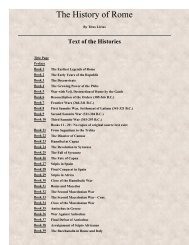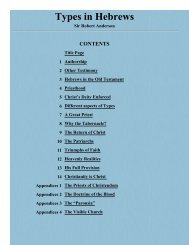The Person of the Holy Spirit - Table of Contents
The Person of the Holy Spirit - Table of Contents
The Person of the Holy Spirit - Table of Contents
You also want an ePaper? Increase the reach of your titles
YUMPU automatically turns print PDFs into web optimized ePapers that Google loves.
was not in <strong>the</strong> program <strong>of</strong> God for this feature <strong>of</strong> <strong>the</strong> ministry <strong>of</strong> <strong>the</strong> <strong>Holy</strong> <strong>Spirit</strong> to become universal among believers prior<br />
to <strong>the</strong> age <strong>of</strong> grace, never<strong>the</strong>less God in His sovereign will and according to His own purposes selected individuals in <strong>the</strong><br />
Old Testament to whom was given <strong>the</strong> abiding presence <strong>of</strong> <strong>the</strong> <strong>Holy</strong> <strong>Spirit</strong>.<br />
<strong>The</strong> first reference to this doctrine is found in Genesis 41:38, where Pharoah asks <strong>the</strong> question concerning Joseph, “Can we<br />
find such a one as this is, a man in whom <strong>the</strong> <strong>Spirit</strong> <strong>of</strong> God is?” While, <strong>of</strong> course, it may be held that Pharoah was mistaken,<br />
and Joseph was not indwelt by <strong>the</strong> <strong>Holy</strong> <strong>Spirit</strong>, in view <strong>of</strong> what Joseph had already accomplished and <strong>the</strong> later revelation <strong>of</strong><br />
<strong>the</strong> doctrine <strong>of</strong> indwelling in <strong>the</strong> Old Testament, it may be concluded that Pharoah unwittingly gave voice to <strong>the</strong> first specific<br />
instance <strong>of</strong> a great doctrine, and <strong>the</strong> Scriptures include his testimony.<br />
Fur<strong>the</strong>r references to this same operation <strong>of</strong> <strong>the</strong> <strong>Spirit</strong> are not difficult to find. <strong>The</strong> tailors who made <strong>the</strong> garments for <strong>the</strong><br />
priests are said to have been “filled with <strong>the</strong> spirit <strong>of</strong> wisdom” (Exod 28:3). Of Bezaleel and Aholiab, fine craftsmen who<br />
helped build <strong>the</strong> tabernacle, it is said, “I have filled him with <strong>the</strong> spirit <strong>of</strong> God, in wisdom, and in all understanding, and in<br />
knowledge, and in all manner <strong>of</strong> workmanship” (Exod 31:3; cf. 35:30-35). <strong>The</strong> seventy elders who assisted Moses were<br />
indwelt by <strong>the</strong> <strong>Holy</strong> <strong>Spirit</strong> (Num 11:17, 25). Joshua is described as “a man in whom is <strong>the</strong> spirit” (Num 27:18). In <strong>the</strong> times<br />
<strong>of</strong> <strong>the</strong> Judges, some <strong>of</strong> <strong>the</strong> leaders raised up to deliver Israel were filled with <strong>the</strong> <strong>Spirit</strong>: Othniel (Judg 3:10), Gideon (Judg<br />
6:34), Jephthah (Judg 11:29), and Samson (Judg 13:25; 14:6, 19; 15:14). A. B. Simpson would add Deborah to <strong>the</strong> list, an<br />
illustration <strong>of</strong> a woman leader no doubt indwelt by <strong>the</strong> <strong>Holy</strong> <strong>Spirit</strong> (cf. Judg 4:4ff).12 <strong>The</strong> <strong>Holy</strong> <strong>Spirit</strong> indwelt both Saul and<br />
David (1 Sam 10:9-10; 16:13). <strong>The</strong> prophet Daniel was indwelt by <strong>the</strong> <strong>Holy</strong> <strong>Spirit</strong> (Dan 4:8; 5:11-14; 6:3). No doubt all <strong>the</strong><br />
prophets were indwelt by <strong>the</strong> <strong>Holy</strong> <strong>Spirit</strong>, though this was not necessarily essential to <strong>the</strong>ir ministry. From <strong>the</strong>se specific<br />
instances and inferences which may be fairly drawn in o<strong>the</strong>r cases, <strong>the</strong> fact that <strong>the</strong> <strong>Holy</strong> <strong>Spirit</strong> indwelt some saints in <strong>the</strong><br />
Old Testament can be conclusively established.<br />
Several features <strong>of</strong> <strong>the</strong> indwelling <strong>of</strong> <strong>the</strong> <strong>Holy</strong> <strong>Spirit</strong> in <strong>the</strong> Old Testament are quite distinctive from <strong>the</strong> same ministry in <strong>the</strong><br />
age <strong>of</strong> grace. It will be noted, first, that <strong>the</strong> coming <strong>of</strong> <strong>the</strong> <strong>Spirit</strong> to indwell individuals has no apparent relation to spiritual<br />
qualities. No record is found <strong>of</strong> regeneration in <strong>the</strong>se cases as necessarily antecedent to <strong>the</strong> indwelling <strong>of</strong> <strong>the</strong> <strong>Holy</strong> <strong>Spirit</strong>.<br />
Saul, it is true, received ano<strong>the</strong>r heart (1 Sam 10:9), but this is not <strong>the</strong> normal experience judging by o<strong>the</strong>r instances. A<br />
second important factor quite distinct from indwelling as known in <strong>the</strong> New Testament Church is that indwelling usually is<br />
associated with a special call to service, and it had in view enablement for a specific task. This will be discussed later.<br />
Indwelling ra<strong>the</strong>r than a universal privilege was a sovereign gift. Only a few were indwelt by <strong>the</strong> <strong>Holy</strong> <strong>Spirit</strong>, and <strong>the</strong>se were<br />
known for <strong>the</strong>ir distinctive gift, were sought out as leaders and prophets, and were usually marked men.<br />
A third important distinction found in <strong>the</strong> Old Testament doctrine <strong>of</strong> indwelling was that it was in many cases temporary.<br />
While <strong>the</strong> New Testament saint need never fear loss <strong>of</strong> <strong>the</strong> indwelling presence <strong>of</strong> <strong>the</strong> <strong>Holy</strong> <strong>Spirit</strong>, however He may be<br />
hindered in His ministry by sin, <strong>the</strong> Old Testament saint knew <strong>the</strong> presence <strong>of</strong> <strong>the</strong> <strong>Spirit</strong> was a special privilege which could<br />
be withdrawn at will even as it was given. Thus, <strong>of</strong> Saul, it is revealed that <strong>the</strong> <strong>Holy</strong> <strong>Spirit</strong> left him (1 Sam 16:14), and David<br />
prayed earnestly after his sin, “Cast me not away from thy presence; and take not thy holy <strong>Spirit</strong> from me” (Ps 51:11). No<br />
Christian need ever pray <strong>the</strong> prayer <strong>of</strong> David, but under <strong>the</strong> Old Testament order, <strong>the</strong>re was great danger <strong>of</strong> losing <strong>the</strong><br />
presence <strong>of</strong> <strong>the</strong> <strong>Spirit</strong>. For this reason, <strong>the</strong> presence <strong>of</strong> <strong>the</strong> indwelling <strong>Spirit</strong> in <strong>the</strong> Old Testament must be regarded as<br />
sovereign, a rare ra<strong>the</strong>r than a usual gift, and usually associated with some specific task for which enablement was necessary.<br />
2. <strong>The</strong> Work <strong>of</strong> <strong>the</strong> <strong>Holy</strong> <strong>Spirit</strong> in Restraining Sin.<br />
From <strong>the</strong> very nature <strong>of</strong> <strong>the</strong> <strong>Holy</strong> <strong>Spirit</strong>, one could anticipate that He would be engaged in a ministry designed to restrain sin,<br />
not only in <strong>the</strong> life <strong>of</strong> <strong>the</strong> saint, but also in <strong>the</strong> life <strong>of</strong> <strong>the</strong> unsaved. A study <strong>of</strong> <strong>the</strong> various ministries <strong>of</strong> <strong>the</strong> <strong>Holy</strong> <strong>Spirit</strong> will<br />
reveal that many <strong>of</strong> <strong>the</strong>m tended to restrain from sin. However comparatively few direct references to this ministry are found.<br />
In connection with <strong>the</strong> antediluvian civilization, God said, “My <strong>Spirit</strong> shall not always strive with man, for that he also is<br />
flesh: yet his days shall be an hundred and twenty years” (Gen 6:3). <strong>The</strong> pronouncement that <strong>the</strong> work <strong>of</strong> striving with man<br />
would cease is sufficient evidence that this ministry had been given to <strong>the</strong> world prior to <strong>the</strong> flood. <strong>The</strong> <strong>Holy</strong> <strong>Spirit</strong><br />
undertook to restrain <strong>the</strong> power <strong>of</strong> Satan and <strong>the</strong> display <strong>of</strong> sin <strong>of</strong> <strong>the</strong> human heart.








